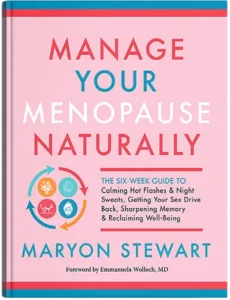
Women often experience panic attacks and even heart palpitations during menopause, even if they’ve never really been bothered by them before. These symptoms may come on suddenly, sometimes just prior to a hot flash, and be very frightening. One of the participants in my program reported that she had been taken to hospital five times in four weeks by ambulance while on holiday in Australia, as she thought she was having a heart attack. Doctors found no irregularities, and it turned out that her symptoms were related to menopause. After a few weeks on the Six-Week Natural Menopause Solution, once her “midlife refuel” was under way, her symptoms disappeared and never returned.
You can overcome PMS and menopause symptoms without using drugs or hormones.
Heart disease risk rises for everyone as they age, but for women symptoms can become more evident after the onset of menopause. Menopause does not cause cardiovascular diseases. However, certain risk factors increase around the time of menopause and a high-fat diet, smoking or other unhealthy habits begun earlier in life can also take a toll, said Dr. Nieca Goldberg, a cardiologist and an American Heart Association volunteer.
If you do experience cardiac symptoms, it’s best to get them checked out by your doctor, for peace of mind if nothing else.
What is it about menopause that can cause or aggravate these symptoms? When hormone levels fluctuate, the brain sends a message to the hormone-producing adrenal glands, which can cause an adrenaline surge, part of the body’s flight-or-fight response. A survey by the NHAS of one thousand clients found that 91 percent of women had suffered anxiety before their periods, and in severe cases had panic attacks and palpitations leading up to their periods. These symptoms can get worse as we age, because falling nutrient levels can impede normal hormone function. Once your nutrient levels and hormones are back in balance, your sense of well-being will likely return.
Easing Palpitations and Panicky Feelings
Eliminate caffeine from your diet. Even teas, coffee, or soft drinks labeled as decaffeinated may contain enough residual caffeine to cause anxiety.
Eat regular, Eating wholesome meals and snacks provide your brain and nervous system with a constant supply of nutrients. Foods such as vegetables, fruits, whole grains, low-fat dairy products and lean protein foods contain the nutrients you need and should make up the majority of your meals and snacks.
Drink plenty of water. Water keeps you hydrated and may help manage hot flashes. It also helps move dietary fiber through the body, which is especially important if you’re working on increasing your fruit and vegetable intake.
Minimize your consumption of alcohol. Although an occasional glass of wine or cocktail are okay, regular drinking impedes the absorption of many important nutrients and can leave you feeling anxious.
Don’t smoke. Nicotine may seem to have a calming effect, but it is also a stimulant that should be avoided.
Mindfulness. Practice formal relaxation or meditation each day. Meditation is one of the ways you can practice being mindful. By focusing on your breath and relaxing your body, you can tune out of what’s going on in the outside world, staying instead in an internal quiet moment.
Add a dietary supplement. Supplements can eliminate hot flashes, boost mood, and help you manage hormonal weight gain. Take a good broad-spectrum multivitamin and mineral supplement each day.
Adaptogen Herbs for Menopause. Ashwagandha usually tops the list of popular adaptogens. It’s calming, supports energy, and may help reduce oxidative stress. Ashwagandha could help regulate your mood and stress levels throughout the day while helping you sleep more deeply at night. Other supplements that can help you feel calmer include rhodiola to reduce levels of the stress hormone cortisol and holy basil, also known as Tulsi, a traditional and Ayurvedic herb used to help with fatigue and anxiety. These adaptogenic herbs help your body deal with an elevated stress response.
Exercise and menopause. Exercise also helps improve mood. Hormones, called endorphins, are released in the brain. Improved mood lasts for several hours. It also helps the body fight stress. Always check with your healthcare provider before starting an exercise program, particularly if you have been sedentary. Your healthcare provider can recommend the best exercise program for you.
Enjoy your golden years!
Entering menopause is a sure change in life, so embrace the change. When you begin feeling anxious, take a few slow, deep breaths and mindfully bring your attention to the moment. Repeating calming affirmations can be helpful at this point, as can focusing on something beautiful, like a flower or one of your favorite pictures.



Leave a Reply